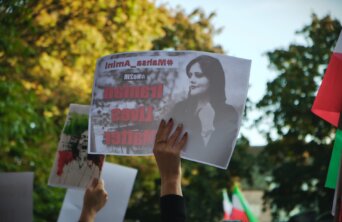- About
- Topics
- Story
- In-Depth
- Picks
- Opinion
- News
- Donate
- Signup for our newsletterOur Editors' Best Picks.Send
Read, Debate: Engage.
| topic: | Freedom of Expression |
|---|---|
| located: | Iran |
| editor: | Gloria Rosary |
In September of last year, Niloofar Hamedi, a journalist, unveiled the tragic fate of Mahsa Amini, a 22-year-old Iranian-Kurdish girl who lost her life at the hands of Iran's morality police. Through photographs, Hamedi exposed the devastating scene of Amini's lifeless body in the hospital. Shortly thereafter, Elahe Mohammadi, another journalist, continued to shed light on the event by covering Amini's funeral in Saghez, Kurdistan. However, the pursuit of truth came at a high price for both journalists, as they were subsequently arrested and have been enduring the harsh conditions of solitary confinement ever since.
In October 2022, the Islamic Revolutionary Guard Corps (IRGC) and the Ministry of Intelligence and Security accused the two journalists of collaborating with the government of the United States, as well as engaging in activities deemed harmful to national security. However, legal experts have raised valid concerns regarding the credibility of these charges, particularly in the absence of a state of war between Iran and the United States.
Even if one were to entertain these allegations, the prolonged detention of eight months without due process or a fair trial is not only unreasonable, but also a clear violation of their fundamental human rights.
The editors of the publications they worked for emphasised that the journalists were merely fulfilling their professional duties as instructed by the newspaper.
Five months later, just before Persian New Year, when numerous imprisoned activists were granted forgiveness by the supreme leader, Niloofar Hamedi and Elahe Mohammadi were excluded from this act of mercy. In response, a campaign was launched by journalists and social activists, demanding a public, transparent, and fair trial for the two journalists.
Unfortunately, their pleas seemed to have been ignored, as their trial was conducted behind closed doors on 29 and 30 May. Their attorneys were only granted one day to meet their clients before the trial, and the court session itself lasted a mere two hours. Furthermore, the attorneys were not given an opportunity to defend their clients, and the families and friends of Hamedi and Mohammadi were denied access to the trial.
The future of these young journalists remains uncertain and raises grave concerns, reflecting the pervasive environment of oppression faced by journalists and activists in Iran. Their arrest without justification, prolonged detention without due process and denial of a fair trial underscore the challenges they confront.
Meanwhile, Niloofar Hamedi and Elahe Mohammadi have received prestigious Press Freedom Awards from UNESCO, Canadian Journalists for Free Expression, The Association of German Journalists (DJV) of Hessen, the German Association of investigative journalists and the Nieman Foundation for Journalism at Harvard University.
These accolades, coupled with ongoing campaigns both within and outside the country, are aimed at increasing awareness, advocating for justice and ensuring that the voices of Niloofar Hamedi, Elahe Mohammadi, and countless others who have been unjustly silenced are heard.
Image by Artin Bakhan.
